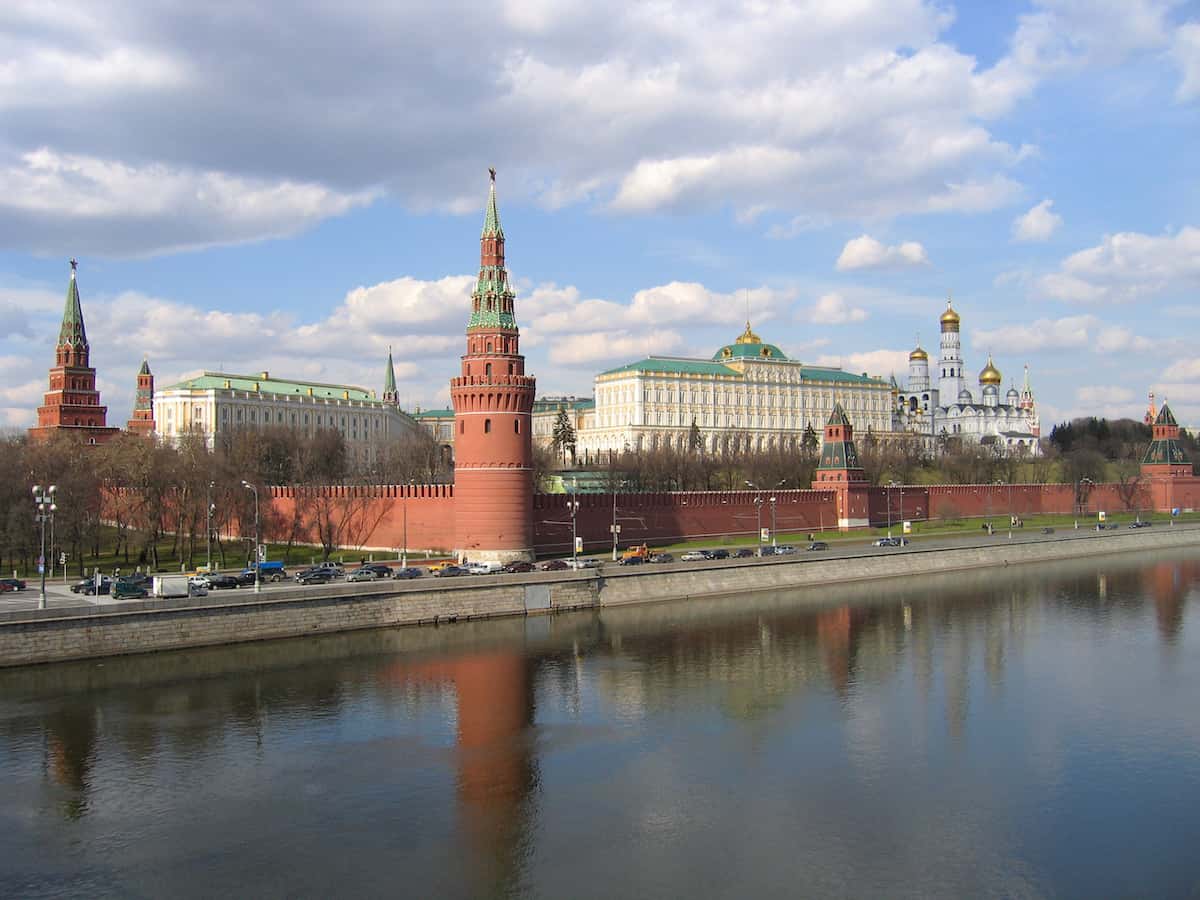Russia’s plan to invade Ukraine hasn’t only gotten a show of dissent from the world but also brought in economic sanctions that could harm the Russian economy.
European Commission President Ursula von der Leyen and French President Emmanuel Macron were among the first few who announced they would inflict “maximum impact on the Russian economy and political elite.” Then came Japan, Australia, New Zealand and Taiwan — all condemning Russia’s military actions.

The United States and the United Kingdom also unveiled plans to counter the actions of Russian President Vladimir Putin. Payment service providers like Visa, Mastercard and PayPal have announced the suspension of operations in Russia.
So far, the economic sanctions have already had a serious impact on the Russian ruble, which sank to record lows and is currently trading at 134.5 to the U.S. dollar. Russia’s MOEX index, the ruble-denominated benchmark for the nation’s stock market, also took a major hit and is trading at one of its lowest levels, with many of the stocks on the list in free fall.
But, the important questions here are: what are these sanctions that have the power to damage a country’s currency and even its stock market, and can a country use cryptocurrency to lessen the impact?
Sanctions and their impact
Economic sanctions, broadly defined, are financial and commercial penalties applied by one or more countries against a group, an individual or another nation.
The definition is quite self-explanatory: strategic decisions by governments and multinational bodies to threaten or punish entities that violate international norms of behavior.
In the case of Russia, the economic sanctions are imposed to impair the ability of Russia from being able to carry out basic functions in the international financial system. While most countries that recently announced sanctions aim to impact Russia’s financial sector, the effects can also have a significant impact on the country’s national economic development, including energy and transport sectors, large-scale projects for developing domestic infrastructure, and other industries critical to Russia’s GDP.
For example, the U.S. sanction includes export blocks on Russia’s technology sector. As per the new measures, the U.S. will impose “Russia-wide restrictions on semiconductors, telecommunication, encryption security, lasers, sensors, navigation, avionics and maritime technologies,” which will limit Russia’s ability to advance its military and aerospace sector.
Washington has also applied sanctions on Russian banks, which would prohibit Russian companies from raising money in the United States.
Any sanction when announced results in a reputational loss of the country it is directed at, which in the case of Russia means that its reputation will worsen over the period, leading to a loss of trust in Russian companies from the global investor base, and therefore a drop in the stock price.
While it is difficult for now to track data of aftereffects of sanctions in Russia’s economy, IMF data shows adverse effects of similar sanctions on the economic growth of Iran.
Causing a currency’s value to dip
Sanctions cause a huge outflow of capital resulting from the decrease in domestic production and increase in imports, leading to high volatility in the exchange market. The Iranian rial, for example, lost 70% of its value against the U.S. dollar two years after the U.S. levied sanctions on Iran.
While the full force of recent sanctions against Russia could take time to show effects, history shows that the ruble has lost significant value since July 2014 when the U.S., European Union, and a few other countries first imposed multiple sanctions on Russia.
This brings us to the question: Can cryptocurrency be used to blunt the force of sanctions on Russia?
Where does crypto fit in?
Before we dig in, it’s crucial to understand that cryptocurrencies as a whole are known for their pseudo-anonymous nature. Although crypto-related transactions are traceable, they are difficult to trace to their real facilitator. Moreover, they also function across borders, have no links to a government backer, and can be converted to cash.
So, the narrative “cryptocurrencies are workaround sanctions for Russia” in simple terms is, governments that impose sanctions place broad prohibitions on transactions and dealings with the designated country. Financial institutions like banks and credit card companies enforce these prohibitions by building internal compliance controls and automated systems, which helps detect if the designated entities (people or companies) are involved. But, tracing such activities become more difficult when cryptocurrencies are involved for various reasons, including but not limited to:
- Most peer-to-peer crypto trading platforms don’t follow know-your-customer (KYC) policies or background checks on sanctioned individuals.
- Privacy coins hide the transaction information along with its user, which makes it even more difficult to detect a transaction.
- Mining cryptocurrencies is easy and irrespective of the location. Anyone from anywhere can earn new cryptocurrencies by simply using software to mine the network.
Therefore, if entities from Russia can get hold of a cryptocurrency, all they need is to find ways to trade it for goods or services without having to convert it to the U.S. dollar. An example of that would be Russia’s central bank digital currency, or digital ruble, which the country hopes to use for trade with countries willing to accept it without touching the dollar — which in turn would allow it to avoid sanctions imposed by the U.S.
Some more examples of countries trying to avoid sanctions include Iran using mining to earn Bitcoin that can be used to pay for restricted goods and services in the country, North Korea using money stolen from cyber attacks on crypto exchanges to fund the country’s nuclear and ballistic missile programs, Venezuela launching a “petro” cryptocurrency to make financial transactions through international banks, and Cuba looking to regulate cryptocurrencies to circumvent U.S. restrictions on sending money to Cuba.
Can crypto help Russia avoid sanctions?
According to an analysis by Robert A. Schwinger, in the case of North Korea and Venezuela, the entities involved in using cryptocurrencies to avoid sanctions were seriously charged for their actions. The paper also finds specific laws and rules directed against methods that help countries avoid sanctions. In some of the cases where an entity has been seen violating sanction programs, regulators have imposed civil liability against such crimes.
For example, BitPay was fined US$507,000 in February 2021, and BitMEX founders recently pleaded guilty to violating the U.S. Bank Secrecy Act and agreed to pay a fine of US$10 million.
In addition to keeping an eye on the crypto transactions, U.S. lawmakers have guidelines in place that require crypto service providers to take necessary security measures to ensure they don’t help facilitate deals with prohibited entities. Any violation could lead to both civil and criminal penalties.
Laws are in place if Russia tries to circumvent sanctions via cryptocurrencies. But more importantly, tools are available for companies to put in alert for any transactions “intersecting with sanctioned entities,” said Caroline Malcolm, head of international policy at Chainalysis, a blockchain analytics firm.
But, we still left the part where the government and citizens could use privacy coins — such as Monero or Zcash — to avoid sanctions because they can be a means of hiding transactions. The truth is, either of the cryptocurrency could be used. But, it isn’t as easy as it looks in the books.
Countries that impose sanctions monitor their citizens and businesses, and authorities levy heavy penalties on anyone found trading with a sanctioned entity. So, many vendors opt out of dealings that would be deemed illegal acts. Second, most privacy tokens have low liquidity on even the largest crypto exchanges. For example, the 24-hour volume of Monero (XMR) on Binance, OKX and FTX combined is only US$1.4 million, while Zcash (ZEC) totals US$4.9 million in volume across those same exchanges.
For a large nation such as Russia, it would be impossible to rely on cryptocurrencies with such low liquidity for avoiding sanctions. It would trigger concerns for the facilitating party.
Final thoughts
Cryptocurrencies, due to their pseudonymous nature and unlimited geographical boundaries, represent a strong case of being used to avoid sanctions. Russia, in this case, can use them to bypass the controls upon which sanctions are relying, particularly to transfer money without having to convert to any of the world’s reserve currency. Decentralized and unregulated crypto exchanges can further aid the process.
However, despite the unregulated nature of most cryptocurrencies and crypto exchanges, there is a way to identify transactions, even on a blockchain network. It is called blockchain forensics, where dedicated companies track and interpret the flow of digital assets to link them back to their original facilitator. This data can also be used to find other entities linked to the alleged trade under sanctions.
This boils down to the fact that while cryptocurrencies have the ability to help facilitate trades between countries wanting to avoid imposed sanctions, all such transactions can be tracked — and penalized accordingly.




